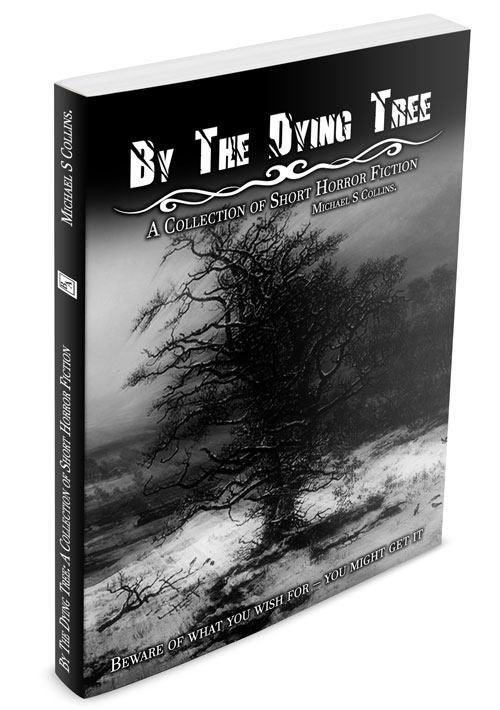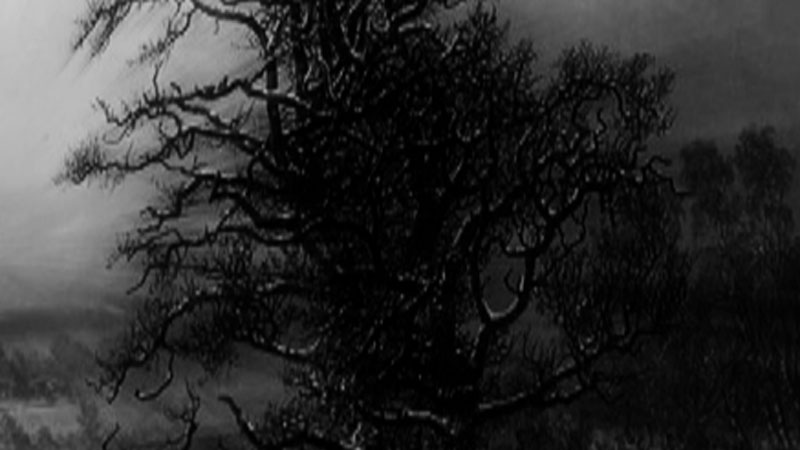Spooky Isles talks to Glasgow-based author MICHAEL S COLLINS on his latest collection of horror short stories, By The Dying Tree…
SPOOKY ISLES: How did you become a writer?
MICHAEL: Well, I taught myself to read and write from a pre-school age, and no one is quite sure how that happened: least of all me. However, I assume you mean: genre wise? Well, my primary school teacher, Mrs Walker, heavily influenced me. She used to sit the class down with twenty minutes before the end of the school day, and read the Goosebumps books by RL Stine. Back then, the chap only had 23 books out for our age group – I think the legend is on 2 million books now – so she would delve into the various anthologies by Richard Dalby. Chillers for Christmas, Mammoth Book of Ghosts, and so on. Then she would set writing tests. Write Your Own Horror Story. That’s where it started, mostly. By age 10, I was writing my own Edwardian style horror stories, complete with all the stereotypes which I naturally assumed were entirely original!
Alas/hooray, they’re all lost now! In short, heavily inspired by Richard Dalby, who sadly died a few days ago.
As for nowadays, one day I thought to myself: I ought to become a writer, and stopping say I would like to be one. So I started writing, in the hope that perhaps the ideas, once used, would run out. Yet here we are… fourteen years on, and the ideas haven’t run out yet at the speed it takes me to write them down.
And don’t get me started on Ideas from Dreams. You wouldn’t believe the number of plot holes they produce…
What appeals to you about supernatural fiction?
You can say stuff, and get away with it. There’s an interview that Rod Serling has with one of the big name US TV interviewers of the 1960s, Mike Wallace. They talk about The Twilight Zone, then a new upcoming TV show, and Wallace says: “So you’ve given up saying anything important?” Now, I strongly disagree there. The Twilight Zone says many important and great things – just look at the Obsolete Man – but Serling got away with a lot which would be censored elsewhere because those in command looked at his show and sneered at it, rather than took in the message. So if you write a ghost story about how we treat foreigners in a post-Brexit landscape, for example, most folk will only see the ghost, but those who need the message of hope, it’s there for them.
You can’t get away with it as much in kitchen sink drama. Then, people look for it.
Also, ghost stories are cool, and escapist.

Who are your favourites in the genre?
A.M. Burrage, the forgotten British master, whose work you can now get in Kindle format off Amazon. He wrote one of my favourite ghost stories, One Who Saw. The hotel in it appears to exist too, but if you think I’m checking out its garden at midnight? Are you crazy? The other big names are all justly great: Algernon Blackwood, EF Benson, and of course, MR James. Outwith the obvious, I am heavily inspired by the writings of AJ Alan, Kurt Vonnegut and Alan Coren. Oh, and Agatha Christie. All of them great people to go to if you’re in a rut and need advice from beyond the grave.
I mean by reading their books, not by consulting Mr Acorah…
How did the By The Dying Tree collection come about?
All the stories were previously published over the last forteen years, but now out of print. There was, I’m told, a demand for them.
What is it that makes Glasgow creepy in the way it has inspired some of your stories?
Overheard on a tube train once: “Well, I could believe anything of Glasgow”.
Anything they say?
Sounds like a challenge to me.
Also, you don’t know ethereal till you’re walking down the Eglinton Toll at 3am in a mist fog. Not a single soul there to greet you, you can’t see two feet in front of yourself. And then someone else coughs…
A few of the stories in the collection are horrific in more of realistic dystopian way – how things might go if the world carries on as it is. What to you makes ‘reality’ scarier than the things people imagine to lurk in the dark?
Well that’s more a question for Duncan Lunan. The story ideas were fictional when I came up with them, and I’m hoping they remain fictional in my lifetime! Reality is always scarier though – ghosts, vampires and that stuff is escapism. Child tax policies and mass murder is all too human. While there are human hands at work in some of my tales, I like to think they are still fantastical ones for now…
What can people take from this collection, which harks back in many ways, to the anthologies of the 70s, and even early 20th century horror fiction?
Ghosts, mostly.
Where do you plan to go next in your writing?
Well, I need to rewrite a book which is basically Romeo and Juliet meets House of Cards, with vampires, and a dragon.
Otherwise, who knows?
By The Dying Tree by Michael S Collins is now available on Amazon.
Join our Newsletter
Get weekly access to our best articles.
We’d love to know what you think about this article.
Join our Spooky Isles Facebook Group and join the chat with other readers.

Author
MJ Steel Collins is an independent publisher and writer based in Glasgow. She owns the small press Beul Aithris Publishing and is Spooky Isles Deputy Editor for Scotland.
Join our Newsletter
Get weekly access to our best articles.



As a published ghost story author myself, and as a lifelong fan of creepy fiction, this review has really aroused my desire to sample this book. Looks a goodie.